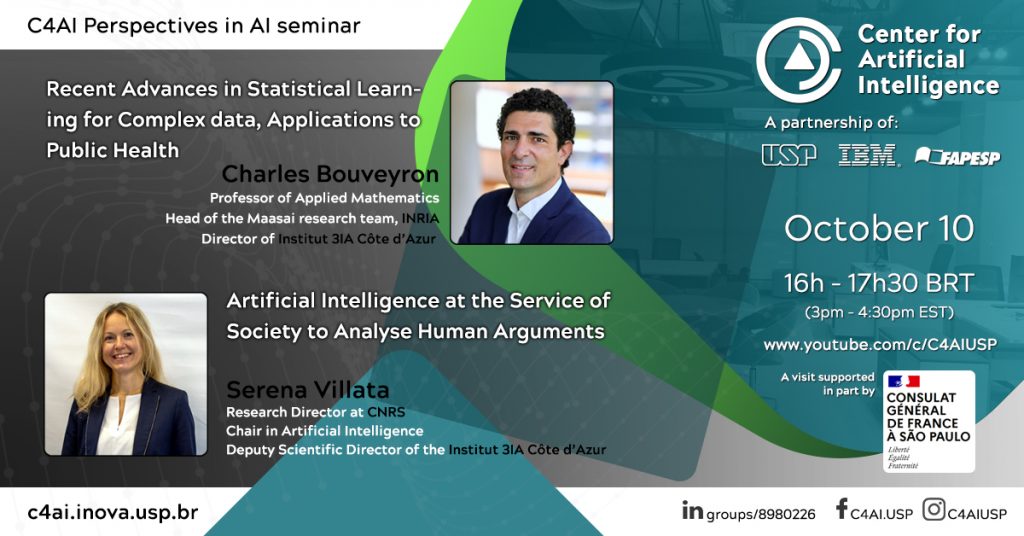
[C4AI – Perspectives in A.I. Seminar] Next talk of the Perspectives in AI seminar of the C4AI will host Prof. Dr. Charles Bouveyron (Professor of Applied Mathematics, Head of the Maasai research team, INRIA and Director of Institut 3IA Côte d’Azur) to talk about “Recent Advances in Statistical Learning for Complex data, Applications to Public Health” and Prof. Dr. Serena Villata, (Research Director at CNRS, Chair in Artificial Intelligence and Deputy Scientific Director of the Institute 3IA Côte d’Azur), to talk about “Artificial Intelligence at the Service of Society to Analyse Human Arguments” on October 10th, 16h – 17h30 Brasilia time (3pm – 4:30pm EST) – (open/free/online event).
Link YOUTUBE – C4AI Channel
https://www.youtube.com/watch?
Live meeting at C4AI at Inova USP Building for C4AI members and associates – São Paulo, SP
About the Seminar:
Prof. Bouveyron – Abstract: We will browse a few recent works in the context of Statistical Learning for the modeling and the analysis of complex data. We will in particular focus on (deep) latent variable models for the clustering of networks with textual edges and the dynamic count data. The presented methods will be also illustrated on real-world examples coming from the public health framework.
Prof. Serena Villata- Abstract: The talk will look at work that conjugates argument-based reasoning frameworks with natural language arguments extracted from text. Applications range from legal and medical texts, to political debates and social network harmful content (abusive language, disinformation).
Short bio: Dr. Charles Bouveyron is Full Professor of Statistics with Université Côte d’Azur and the director of the Institut 3IA Côte d’Azur, one of the four French interdisciplinary institutes on Artificial Intelligence. He is the head of the Maasai research team, a joint team between INRIA and Université Côte d’Azur, gathering mathematicians and computer scientists for proposing innovative models and algorithms for Artificial Intelligence. His research interests include include high-dimensional statistical learning, adaptive learning, statistical network analysis, learning from functional or complex data, with applications in medicine, image analysis and digital humanities. He has published extensively on these topics (more than 50 journal articles) and he is author of the monograph “Model-based Clustering and Classification for Data Science” (Cambridge University Press, 2019). He is the founding organizer of the series of workshops StatLearn. Previously, he worked at Université Paris Descartes (Full Professor, 2013-2017), Université Paris 1 Panthéon-Sorbonne (Ass. Professor, 2007-2013) and Acadia University (Postdoctoral researcher, 2006-2007). He received the Ph.D. degree in 2006 from Université Grenoble 1 (France) for his work on high-dimensional classification.
Website: https://math.unice.fr/~cbouveyr/
Short bio: Dr. Serena Villata is a research director in computer science at the CNRS and she pursues her research at the I3S laboratory in Sophia Antipolis (France). Her research area is Artificial Intelligence (AI), and her current work focuses on artificial argumentation, with a specific focus on legal and medical texts, political debates and social network harmful content (abusive language, disinformation). Her work conjugates argument-based reasoning frameworks with natural language arguments extracted from text. She is the author of more than 150 scientific publications in AI. Since July 2019, she has been awarded with a Chair in Artificial Intelligence at the Interdisciplinary Institute for Artificial Intelligence 3IA Cote d’Azur on “Artificial Argumentation for Humans”. She became the Deputy Scientific Director of the 3IA Côte d’Azur Institute in January 2021. Since December 2019, she is a member of the National Committee for Digital Ethics (CNPEN).
Website: https://www.i3s.unice.fr/~villata/Home.html
C4AI Youtube Channel : https://www.youtube.com/c/C4AIUSP






Comments are closed